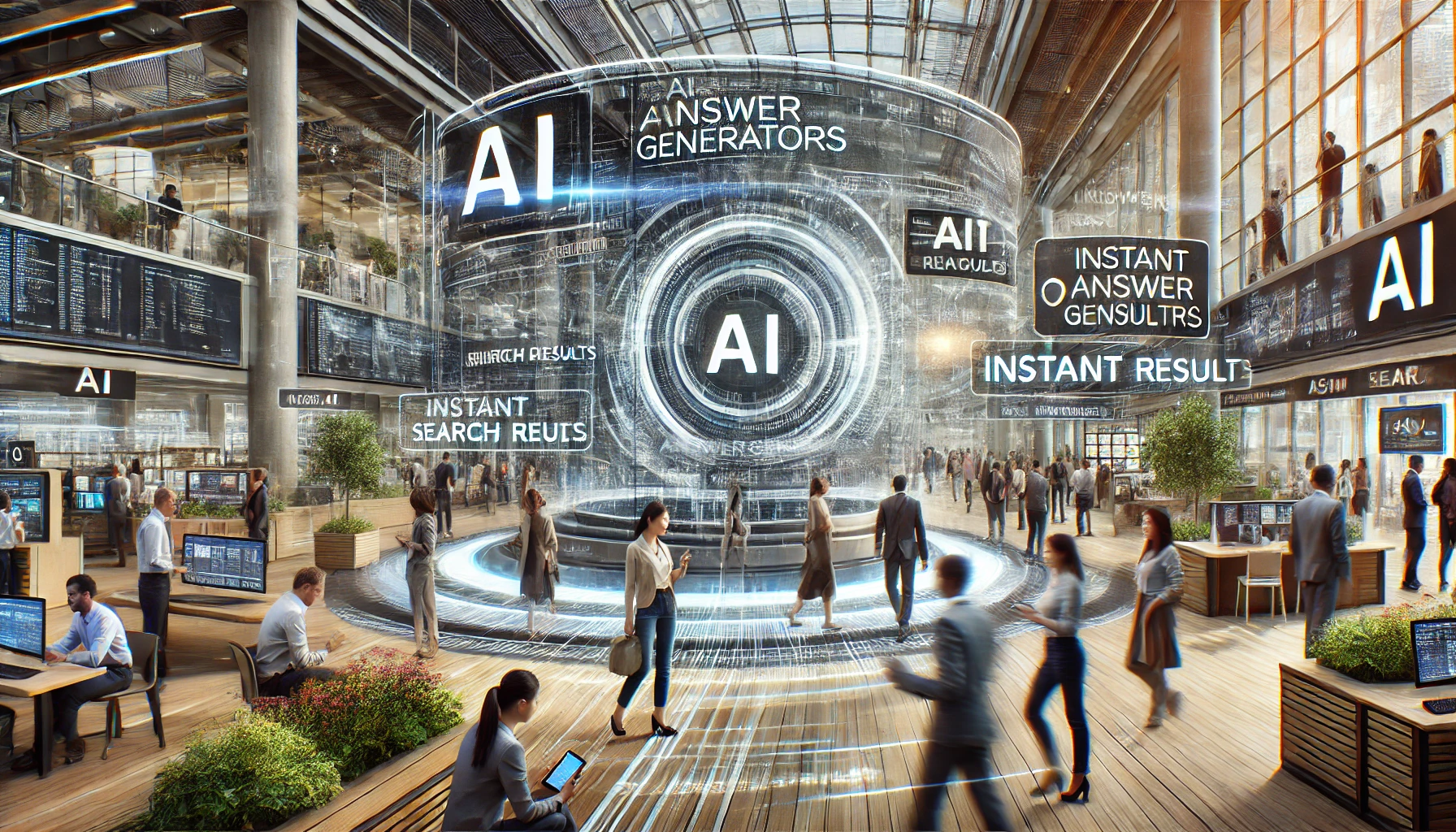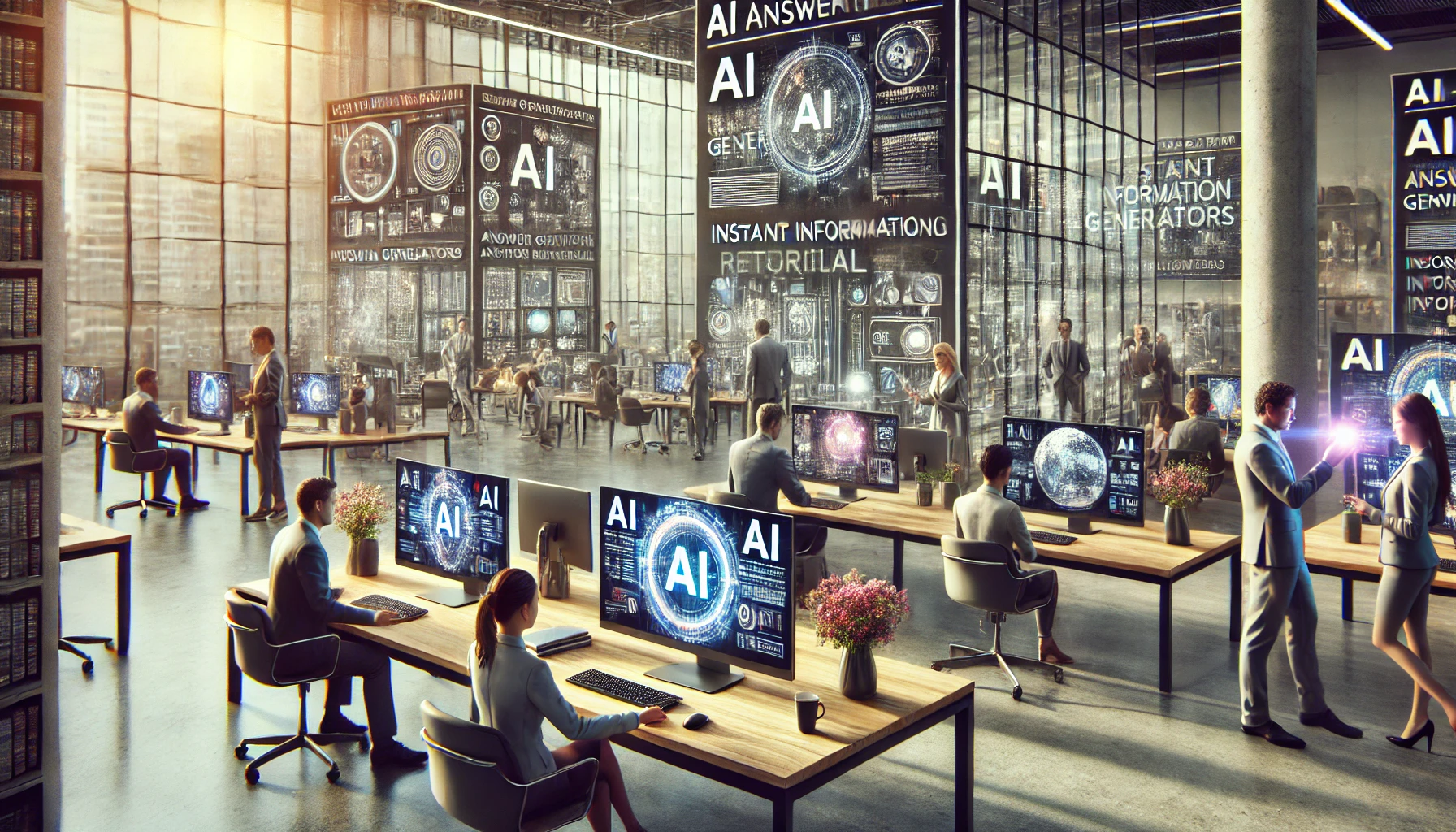
Introduction
In the digital age, the way we access information has been revolutionized by artificial intelligence (AI). AI answer generators are at the forefront of this transformation, providing instant, accurate, and human-like responses to queries. These tools have shifted the paradigm from traditional search engines, which offer a list of links, to AI models that generate direct, context-aware answers. This article will explore the workings of AI answer generators, their applications, benefits, challenges, and future impact on how we seek and use information.
What Are AI Answer Generators?
AI answer generators are advanced models designed to provide immediate and relevant answers to user queries by leveraging large-scale machine learning techniques and vast datasets. Unlike traditional search engines that provide links to relevant pages, AI answer generators directly respond to questions, making information retrieval more streamlined and efficient.
How AI Answer Generators Work
- Natural Language Processing (NLP): AI answer generators utilize NLP, a branch of AI that enables computers to understand, interpret, and generate human language. This technology helps AI understand the context of questions, recognize keywords, and generate coherent and contextually appropriate responses.
- Deep Learning Models: Models like GPT-4 (Generative Pre-trained Transformer) and other state-of-the-art AI models are pre-trained on large datasets that include books, articles, websites, and other textual data. These models learn the structure and nuances of language, enabling them to respond accurately to a wide range of questions.
- Training and Fine-Tuning: After the initial training phase, these models are fine-tuned with more specific datasets to improve their performance in targeted applications, such as answering specific questions or providing industry-specific information.
- Continuous Improvement: AI answer generators continually learn from user interactions, which helps refine their accuracy and relevance over time. This adaptive learning process ensures that the models evolve based on new information and user feedback.
Popular AI Answer Generators
Several AI answer generators have gained widespread recognition for their advanced capabilities and user-friendly interfaces:
- ChatGPT by OpenAI: ChatGPT is one of the most popular AI models known for its versatility in answering a broad spectrum of questions. It is used in customer service, content creation, and as a general information tool.
- Google Bard: Google Bard is designed to provide informative and interactive responses, making it a valuable tool for educational and professional applications.
- Bing Chat by Microsoft: Microsoft’s AI-powered search engine integrates traditional search results with conversational AI responses, enhancing the overall search experience.
Applications of AI Answer Generators
AI answer generators are integrated into various sectors, enhancing efficiency, accuracy, and user engagement. Here are some of the key applications:
- Customer Service and Support
- AI answer generators are extensively used in customer service to automate responses to common queries, troubleshoot issues, and guide customers through various processes. This reduces wait times, improves user satisfaction, and allows human agents to focus on more complex tasks.
- Example: Companies like Zendesk integrate AI answer generators to streamline customer support, enhancing response times and consistency.
- Education and Learning
- AI answer generators provide personalized learning experiences by assisting students with homework, explaining complex topics, and offering practice questions. These tools enhance self-study and make learning more interactive.
- Example: Educational platforms like Quizlet use AI to help students with flashcards, quizzes, and explanations tailored to individual learning needs.
- Content Creation and Writing Assistance
- Writers, marketers, and bloggers use AI answer generators to brainstorm ideas, draft content, and refine text. These tools save time and enhance creativity by generating relevant information and suggestions.
- Example: Tools like Jasper AI provide automated content generation, helping creators produce high-quality articles, social media posts, and marketing copy quickly.
- Healthcare and Medical Information
- In healthcare, AI answer generators assist professionals and patients by providing medical advice, answering health-related questions, and offering symptom checks. These tools improve access to information and support decision-making.
- Example: AI-driven platforms like Ada Health use advanced models to deliver personalized health assessments and guidance.
- Legal and Financial Services
- AI answer generators are used in legal and financial services to provide quick answers to regulatory questions, help draft legal documents, and offer financial advice. This automation reduces the need for lengthy consultations and speeds up processes.
- Example: AI tools are used in financial planning apps to provide personalized investment advice and respond to complex financial queries.
- Daily Productivity and Personal Assistance
- AI answer generators act as personal assistants, helping users manage their schedules, draft emails, and even suggest responses to messages. This automation enhances productivity and streamlines daily tasks.
- Example: Digital assistants like Google Assistant and Alexa use AI to answer questions, set reminders, and provide personalized recommendations based on user habits.
Benefits of AI Answer Generators
- Instant Access to Information: AI answer generators provide immediate responses, eliminating the need to sift through multiple web pages or sources. This rapid access to information saves time and improves decision-making.
- Enhanced User Experience: By offering direct answers rather than lists of links, AI models create a more engaging and satisfying user experience. They cater to the user’s specific needs, making interactions more personalized.
- Accuracy and Consistency: AI models are trained on vast and diverse datasets, allowing them to deliver accurate and consistent answers. Unlike humans, AI does not suffer from fatigue or errors due to oversight.
- 24/7 Availability: AI answer generators operate around the clock, providing continuous support without the need for breaks or downtime. This ensures users have access to information whenever they need it.
- Cost Efficiency: For businesses, implementing AI answer generators reduces the need for large customer service teams, lowering operational costs. This automation allows companies to allocate resources more strategically.
- Scalability: AI models can handle a large volume of queries simultaneously, making them ideal for businesses and services with high traffic. This scalability ensures consistent performance, even during peak times.
Challenges and Considerations
- Accuracy and Reliability: While AI answer generators are highly advanced, they are not infallible. They can produce incorrect or misleading information, especially if the input is vague or complex. Users must critically evaluate AI-generated responses.
- Bias and Fairness: AI models learn from the data they are trained on, which can include biases present in that data. This can result in biased responses that perpetuate stereotypes or provide unbalanced information. Continuous monitoring and updates are required to mitigate these biases.
- Data Privacy Concerns: AI answer generators often process sensitive information, raising concerns about data security and privacy. Ensuring compliance with privacy laws and implementing strong data protection measures are crucial.
- Dependence on Technology: Over-reliance on AI can lead to reduced human skills in problem-solving and critical thinking. It is important to balance AI use with human oversight to maintain a healthy level of personal engagement and accountability.
- The complexity of Understanding Context: AI answer generators can sometimes struggle with understanding context, sarcasm, or nuanced language, leading to responses that may not fully align with the user’s expectations.
Tips for Effective Use of AI Answer Generators
- Use Clear and Specific Queries: The quality of the response often depends on the clarity of the input. Providing specific, detailed questions helps AI generate more accurate and relevant answers.
- Review and Edit Responses: Always review AI-generated responses for accuracy and relevance. Editing or refining the output ensures that the information meets your needs.
- Implement Feedback Mechanisms: Incorporate feedback loops that allow users to rate the accuracy of AI responses. This helps improve the model’s performance over time through continuous learning.
- Combine AI with Human Oversight: For complex or sensitive topics, ensure that human experts review AI-generated answers. This combination of AI efficiency and human judgment enhances the overall quality of responses.
- Regularly Update the Model: Keep the AI model updated with new data and improvements to maintain accuracy and relevance. Regular updates help the model stay current with emerging trends and information.
Future of AI Answer Generators
The future of AI answer generators is promising, with continuous advancements to make these tools even more accurate, personalized, and context-aware. Future developments may include improved emotional intelligence, enabling AI to detect and respond to user emotions, further enhancing the interaction experience.
Integration with other emerging technologies, such as augmented reality (AR) and virtual reality (VR), could provide users with more immersive and interactive ways to access information. Additionally, as AI models become more refined, we can expect fewer biases and a stronger focus on ethical AI development.
Moreover, as AI answer generators become more integrated into daily life, their role will expand beyond traditional applications, influencing education, healthcare, business, and personal productivity on a deeper level.
Conclusion
AI answer generators are transforming the way we access and interact with information. These tools enhance user experience, improve decision-making, and streamline processes across various sectors by providing instant, accurate, and contextually relevant responses. As AI technology evolves, answer generators will play an increasingly central role in our digital landscape, shaping the future of information retrieval and automated communication.


Thanks for sharing. I read many of your blog posts, cool, your blog is very good.